“Despite” vs. “in spite of”: is there a difference between using one word and three separate words?
Are there certain contexts where using “despite” is wrong?
How do these phrases differ?
When becoming a better writer or simply writing in a professional setting, understanding proper grammar makes a world of difference.
Therefore, it is helpful to understand the contrast between “despite” and “in spite of,” given how popular their usage is.
Continue reading to learn the correct ways to use “despite” and “in spite of” in your writing!
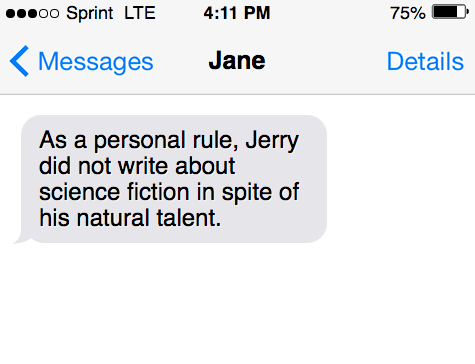
Do “despite” and “in spite of” have the same meaning?
Put simply, “despite” and “in spite of” have the same meaning and can be used interchangeably.
Essentially, there is nothing wrong with using each of the phrases in your writing, as both are grammatically correct.
Additionally, both “despite” and “in spite of” are more commonly used in writing than in speech.
Still, they both work identically in any sentence you write.
Remember that these two prepositions can still be misused under certain circumstances.
However, you can utilize and swap out “despite” and “in spite of” interchangeably.
| Word | Definition |
| Despite (preposition) /dəˈspīt/ | without being affected by; in spite of. |
| In spite of (phrase) | without being affected by the particular factor mentioned. |
Do the separate words make a difference?
The only subtle distinction between “despite” and “in spite of” is that one version is considered more formal by writing experts.
That said, “despite” is considered a little more formal than “in spite of.”
Additionally, “despite” is preferred by authors who value brevity.
Further, some people will use the phrase “in spite of” simply because it sounds better in a certain context.
Either way, there is no drastic contrast between the two phrases.

Which is more popular: “despite “or “in spite of?”
“Despite” is the preferred word to use in edited writing, primarily on account of the fact that it demands fewer words.
For instance, “despite” is used 20 times more often than “in spite of” in major publications like The New York Times and the Guardian.
Still, it isn’t considered a mistake if you use “in spite of” in a professional or academic setting instead of “despite.”
Both ways are correct regardless of the different spellings.
| Linking verb example | Words (linking words/verbs) |
| In spite of recent events, we have to close the cafeteria. | In spite, despite, although, even though, though. |
“Despite” definition
The definition of “despite” varies slightly depending on whether one is using it as a verb, preposition, or noun.
In its verb form, despite’s archaic definition, is “to treat with contempt or disrespect.”
As a noun phrase, the term means “The feeling or attitude of hating someone or something.”
Additionally, the noun can mean “An act showing contempt or defiance.”
Some synonyms for “despite” as a noun include “contempt,” “disdain,” and “scorn.”
Lastly, the preposition form is literally defined as the word’s counterpart “in spite of.”
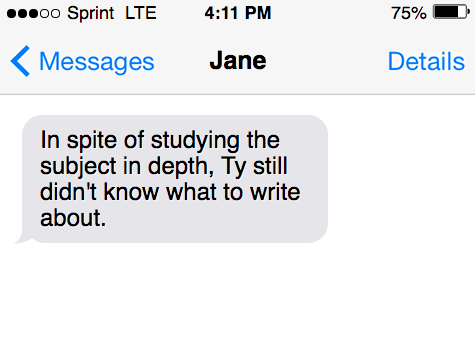
“Spite” definition
While “spite” cannot be used as a preposition like “despite” can, the term can act as both a noun and a verb.
When describing a person, place, or thing, “spite” is defined as “Petty ill will or hatred with the disposition to irritate, annoy, or thwart.”
In comparison, as a verb, “spite” is defined as “To annoy, treat maliciously, or offend.”
Some other nouns that act as synonyms include “meanness,” “nastiness,” and “malice.”
Further, verbs that mean the same thing as “spite” include “gripe,” “bug,” “annoy,” and “bother.”
Using a noun phrase to follow “despite” or “in spite of”
You cannot follow “despite” or “in spite of” with just any type of clause.
However, nouns (people, places, and things) often follow these terms.
Take this comment, for example:
“For the remainder of the lesson, Carly was extremely focused, despite (in spite of) the money that was stolen from her just hours before.”
“Money” acts as the “thing” in this sentence.
Notice how the expression carries the same meaning regardless of which clause we use.
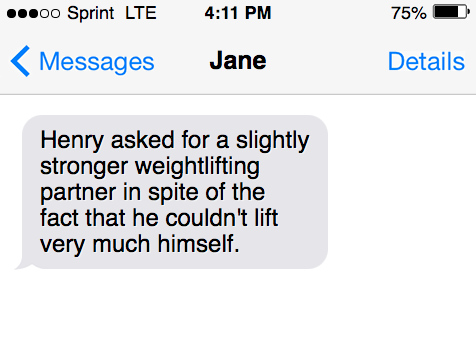
Using a gerund to follow “despite” or “in spite of”
These two terms can also be followed by gerunds.
That said, a gerund is defined as “a form that’s derived from a verb but functions as a person, place, or thing, in English ending in “-ing.”
Expressions such as “Do you mind my asking you?” see “asking” serve as a gerund.
Notice the following sentence, too, which you can swap out “in spite of” and “despite.”
“The group wanted John to feel he was doing an equal job as the rest of them, in spite of his answering all his questions wrong.”
Using “what” or “how” to follow “despite” or “in spite of”
Lastly, “despite” and “in spite of” can be followed by phrases with “what” or “how.”
In these expressions, “what” and “how” function as relative pronouns when they connect phases or as adverbs when they modify an action term.
In this example, “The morning weather wasn’t that cold despite how it appeared,” “despite” immediately proceeds the term “how.”
Or, consider this sentence:
“In spite of what happened to the teacher’s lessons, he was still determined to have a productive class.”
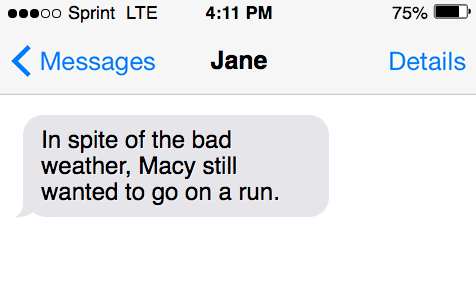
Where to put “despite” or “in spite of” in a sentence
Although “despite” and “in spite of” have a similar meaning, people often get confused about where to put the terms in a sentence.
The prepositions are pretty versatile, as they can be placed at the beginning or middle of a phrase.
In most cases, you need to place an additional clause to describe the flip side of the statement.
Essentially, the statement needs a dependent clause and independent clause when “despite” or “in spite of” are used.
Consider this comment:
“In spite of the rain, the school bus traveled down the path without any difficulty.”
“Rain” is the dependent clause, while “school bus” is the independent clause.
Remember, an independent clause is a clause that can stand alone as a sentence.
A dependent clause does not express a complete thought, so if you were to have a statement with only a dependent clause, there would be a lot of confusion amongst readers.
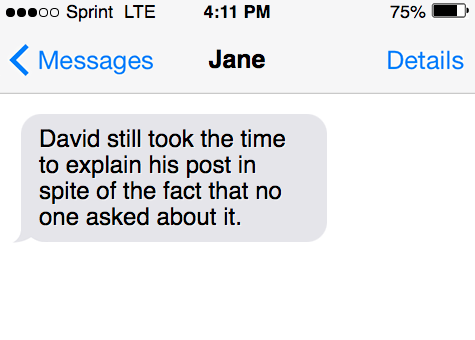
Example sentence using “despite”
If you are still feeling unsure about how to use “despite,” here are a few examples to get you started:
- “The family decided to take a road trip despite the bad weather that was headed their way.”
- “Despite the fact that the answer was written on the chalkboard, Johnny still got the question wrong on the test.”
- “The Instagram post hurt Kaley’s feelings despite the fact that it was not about her.”
- “Kyle was stuck at the DMV for an hour despite having filled out all the proper forms ahead of time.”
- “Despite the bad weather, the football game was beginning at the same time it usually did.”
- “Lucy did everything to try to save her failing grade despite the time it took to do so.”
- “I did not take the time to buy the reading materials yesterday despite the fact that that now means I will have to do so today.”
Examples of “in spite of” in sentences
Remember, the only difference between “in spite of” and “despite” is the spelling.
That said, here are some examples of “in spite of” used in everyday writing:
- “In spite of the bad weather, Macy still wanted to go on a run.”
- “David still took the time to explain his post in spite of the fact that no one asked about it.”
- “I decided to take a nap in the middle of the day today in spite of all the work I must do on the company’s website.”
- “Henry asked for a slightly stronger weightlifting partner in spite of the fact that he couldn’t lift very much himself.”
- “In spite of studying the subject in depth, Ty still didn’t know what to write about.”
- “As a personal rule, Jerry did not write about science fiction in spite of his natural talent.”
- “In spite of having the answer in his notebook, Gerald did not share it with his peers.”
How to remember which of the clauses to use
Between “in spite of” and “despite,” how do you remember which of these prepositions to use?
Remember, the only contrast between the two is the spelling.
As long as a phrase follows the rules of grammar, you can choose to use the word “despite” or the phrase “in spite of.”
Both examples have the same general meaning.
There is one example where you can only use “in spite of” and not “despite.”
That said, the idiom “in spite of oneself” cannot be replaced with the word “despite oneself.”
This common idiom means “Even though one does not want to or expect to.”
Consider this statement:
“I ended up enjoying the subject in spite of myself.”
Although the subject in this post, “I,” didn’t expect or want to enjoy the subject, they still did.
The previous instance is the only one where proper grammar doesn’t allow you to swap “in spite of” with “despite.”
In any other post, you can feel free to use “despite” or “in spite of” in the middle or at the beginning of a statement.
Recall that “despite” is more commonly used simply because it means writing fewer words and, therefore, saves a little time.
Sources
- Despite vs. In Spite Of – What’s the Difference? – Grammarly
- Despite vs. in spite of – Grammarist
- Despite definition- Merriam-Webster
- Spite definition – Merriam-Webster
- What Is a Gerund? Definitions and Examples – Grammarly
- Identifying Independent and Dependent Clauses – Purdue University
- In spite of oneself definition – Merriam-Webster
Inside this article
Fact checked:
Content is rigorously reviewed by a team of qualified and experienced fact checkers. Fact checkers review articles for factual accuracy, relevance, and timeliness. Learn more.
Core lessons
Glossary
- Abstract Noun
- Accusative Case
- Anecdote
- Antonym
- Active Sentence
- Adverb
- Adjective
- Allegory
- Alliteration
- Adjective Clause
- Adjective Phrase
- Ampersand
- Anastrophe
- Adverbial Clause
- Appositive Phrase
- Clause
- Compound Adjective
- Complex Sentence
- Compound Words
- Compound Predicate
- Common Noun
- Comparative Adjective
- Comparative and Superlative
- Compound Noun
- Compound Subject
- Compound Sentence
- Copular Verb
- Collective Noun
- Colloquialism
- Conciseness
- Consonance
- Conditional
- Concrete Noun
- Conjunction
- Conjugation
- Conditional Sentence
- Comma Splice
- Correlative Conjunction
- Coordinating Conjunction
- Coordinate Adjective
- Cumulative Adjective
- Dative Case
- Determiner
- Declarative Sentence
- Declarative Statement
- Direct Object Pronoun
- Direct Object
- Diction
- Diphthong
- Dangling Modifier
- Demonstrative Pronoun
- Demonstrative Adjective
- Direct Characterization
- Definite Article
- Doublespeak
- False Dilemma Fallacy
- Future Perfect Progressive
- Future Simple
- Future Perfect Continuous
- Future Perfect
- First Conditional
- Irregular Adjective
- Irregular Verb
- Imperative Sentence
- Indefinite Article
- Intransitive Verb
- Introductory Phrase
- Indefinite Pronoun
- Indirect Characterization
- Interrogative Sentence
- Intensive Pronoun
- Inanimate Object
- Indefinite Tense
- Infinitive Phrase
- Interjection
- Intensifier
- Infinitive
- Indicative Mood
- Participle
- Parallelism
- Prepositional Phrase
- Past Simple Tense
- Past Continuous Tense
- Past Perfect Tense
- Past Progressive Tense
- Present Simple Tense
- Present Perfect Tense
- Personal Pronoun
- Personification
- Persuasive Writing
- Parallel Structure
- Phrasal Verb
- Predicate Adjective
- Predicate Nominative
- Phonetic Language
- Plural Noun
- Punctuation
- Punctuation Marks
- Preposition
- Preposition of Place
- Parts of Speech
- Possessive Adjective
- Possessive Determiner
- Possessive Case
- Possessive Noun
- Proper Adjective
- Proper Noun
- Present Participle
- Prefix
- Predicate



